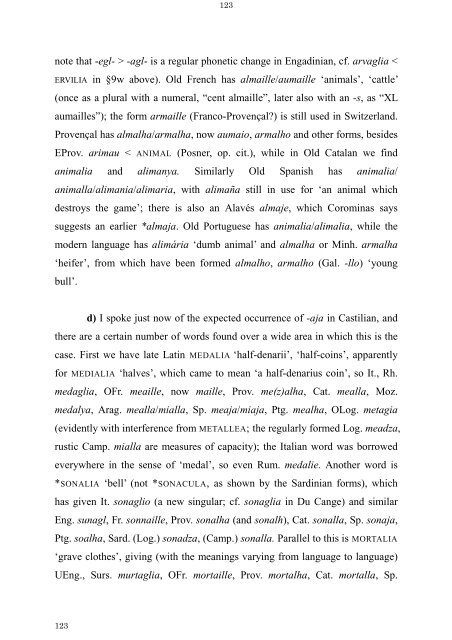The Latin Neuter Plurals in Romance - Page ON
The Latin Neuter Plurals in Romance - Page ON
The Latin Neuter Plurals in Romance - Page ON
Create successful ePaper yourself
Turn your PDF publications into a flip-book with our unique Google optimized e-Paper software.
123<br />
123<br />
note that -egl- > -agl- is a regular phonetic change <strong>in</strong> Engad<strong>in</strong>ian, cf. arvaglia <<br />
ERVILIA <strong>in</strong> §9w above). Old French has almaille/aumaille ‘animals’, ‘cattle’<br />
(once as a plural with a numeral, “cent almaille”, later also with an -s, as “XL<br />
aumailles”); the form armaille (Franco-Provençal?) is still used <strong>in</strong> Switzerland.<br />
Provençal has almalha/armalha, now aumaio, armalho and other forms, besides<br />
EProv. arimau < ANIMAL (Posner, op. cit.), while <strong>in</strong> Old Catalan we f<strong>in</strong>d<br />
animalia and alimanya. Similarly Old Spanish has animalia/<br />
animalla/alimania/alimaria, with alimaña still <strong>in</strong> use for ‘an animal which<br />
destroys the game’; there is also an Alavés almaje, which Corom<strong>in</strong>as says<br />
suggests an earlier *almaja. Old Portuguese has animalia/alimalia, while the<br />
modern language has alimária ‘dumb animal’ and almalha or M<strong>in</strong>h. armalha<br />
‘heifer’, from which have been formed almalho, armalho (Gal. -llo) ‘young<br />
bull’.<br />
d) I spoke just now of the expected occurrence of -aja <strong>in</strong> Castilian, and<br />
there are a certa<strong>in</strong> number of words found over a wide area <strong>in</strong> which this is the<br />
case. First we have late <strong>Lat<strong>in</strong></strong> MEDALIA ‘half-denarii’, ‘half-co<strong>in</strong>s’, apparently<br />
for MEDIALIA ‘halves’, which came to mean ‘a half-denarius co<strong>in</strong>’, so It., Rh.<br />
medaglia, OFr. meaille, now maille, Prov. me(z)alha, Cat. mealla, Moz.<br />
medalya, Arag. mealla/mialla, Sp. meaja/miaja, Ptg. mealha, OLog. metagia<br />
(evidently with <strong>in</strong>terference from METALLEA; the regularly formed Log. meadza,<br />
rustic Camp. mialla are measures of capacity); the Italian word was borrowed<br />
everywhere <strong>in</strong> the sense of ‘medal’, so even Rum. medalie. Another word is<br />
*S<strong>ON</strong>ALIA ‘bell’ (not *S<strong>ON</strong>ACULA, as shown by the Sard<strong>in</strong>ian forms), which<br />
has given It. sonaglio (a new s<strong>in</strong>gular; cf. sonaglia <strong>in</strong> Du Cange) and similar<br />
Eng. sunagl, Fr. sonnaille, Prov. sonalha (and sonalh), Cat. sonalla, Sp. sonaja,<br />
Ptg. soalha, Sard. (Log.) sonadza, (Camp.) sonalla. Parallel to this is MORTALIA<br />
‘grave clothes’, giv<strong>in</strong>g (with the mean<strong>in</strong>gs vary<strong>in</strong>g from language to language)<br />
UEng., Surs. murtaglia, OFr. mortaille, Prov. mortalha, Cat. mortalla, Sp.









